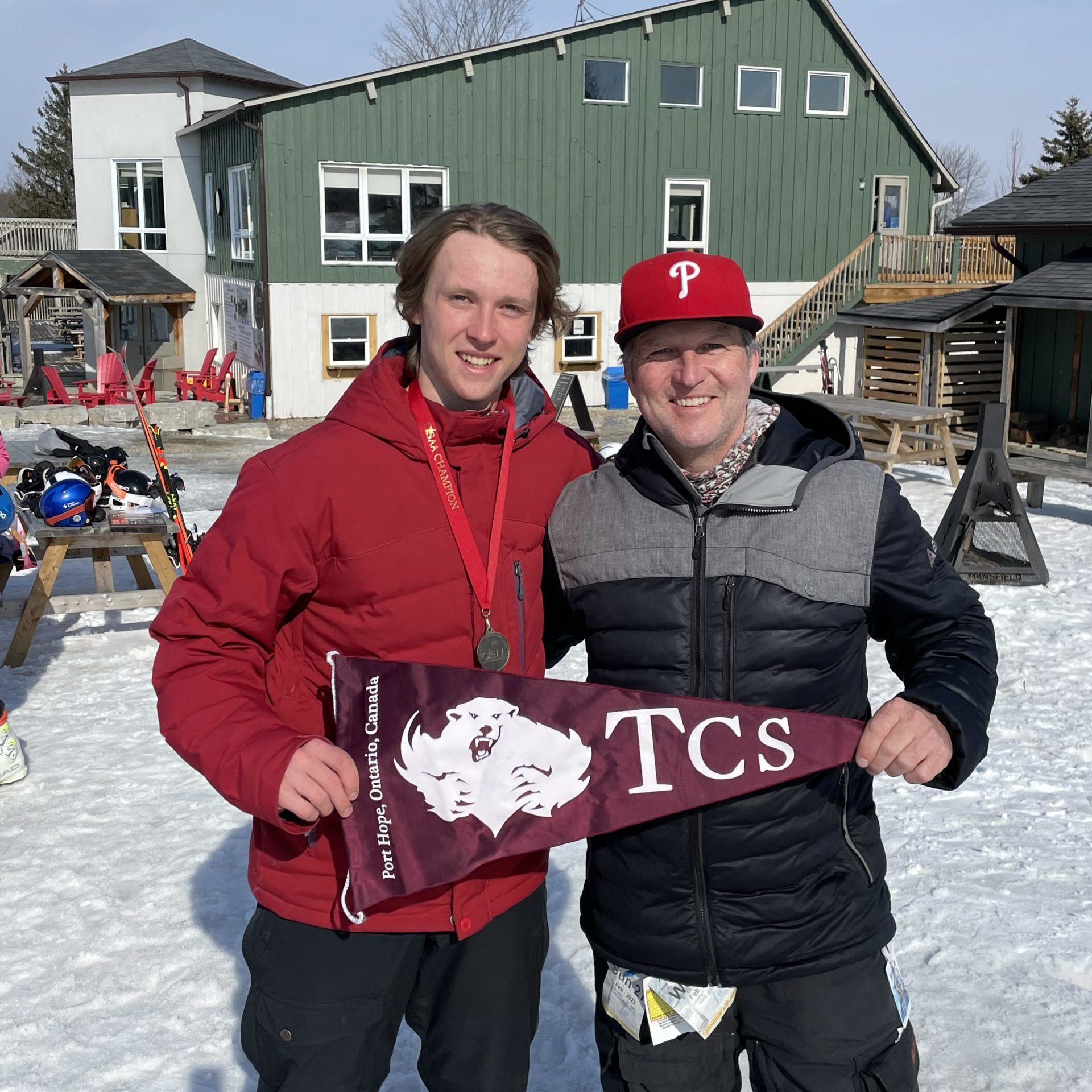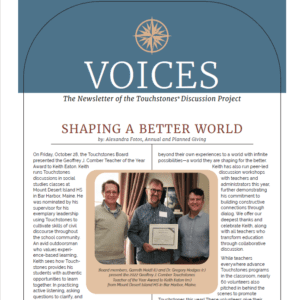Interview by Lysithia Page, Touchstones Summer Intern
I met with Dr. Greg Hodges over Zoom to discuss his experiences with Touchstones discussions. Greg is the Director of International Learning and the Head of Languages & Culture and Social Sciences at Trinity College School in Ontario. He has incorporated Touchstones lessons into his high school curriculum for over a decade.
Lysithia Page: How did Touchstones enter the picture for you?
Greg Hodges: When I arrived at [Trinity College School], I found that a lot of the students were very motivated to succeed, but their measures of success were always tied to objectives that could be readily represented on a report card—quantities. What was missing, in a word, was literacy. They weren’t becoming literate citizens. I was trying to find ways to address that problem. I remembered that Howard Zeiderman had been a seminar leader of mine [at St. John’s College], and I had always heard about Touchstones. I said, ‘You know what, this might be a great opportunity to explore it more.’ So I took it upon myself to share some of the prototypes [of Touchstones lessons] with senior leadership at my school. It seemed to strike a chord. What happened next was that the school decided to make it an institutional part of our program. It’s foundational as well as fundamental to what those students learn. That’s how I came back to this learning model, using Touchstones as the firmament upon which to build the pedagogical method for my classes.
LP: It sounds like the problem you diagnosed in the beginning is that students struggle to develop their critical thinking skills.
GH: They think they are, but what they’re really doing is learning to do tricks. The tricks they’re learning how to do involve meeting the expectations, either overt or covert, of their teacher, a curriculum, or, let’s say, a standardized test. It’s disingenuous. So I was wondering whether they’re going to develop the habits they need to become lifelong learners. That’s what attracts me to Touchstones. It distinguishes itself because it has a method and recognizes that individuals and groups go through stages of growth, development, challenge, and change. The readings are selected, curated, and deployed to meet those challenges, allow participants to become overtly aware of what those challenges might be.
LP: How do you see your students’ experiences with Touchstones aiding them in their development as literate citizens? How do they learn to work together?
GH: In the opening weeks of my philosophy class, in which I use “Mapping the Future,” you can see this silo-ing of the participants, in which they think it’s enough for them to be able to perform. That performance tends both to isolate them. That’s what I see very early on. By the time that we get to discussing Martin Luther King’s “Letter from Birmingham Jail,” there is this notion that we as a group can recognize law, we can establish rules, and how we can break them as well, how we do that collectively. And most importantly, as Martin Luther King will say, how we do that with love. It’s no longer their ideas they may have derived from simple introspection or through a Google search, but rather through a practice, a habit, a product that is shared, and that can surprise them. I have a student who has had such a wonderful time with Touchstones that they want to have a separate club at my school where they can have different kids from different ages, and they want to just be able to run with it. And I’m like, ‘Okay, let’s see how this can go,’ and really turn it over to them. That’s something that happened in the last year. People are hungering for that kind of engagement and that kind of contact.
LP: What challenges do you see students typically facing as they initially participate in Touchstones discussions?
GH: Some students will say, ‘I know these texts,’ ‘I don’t know why I have to read these things,’ ‘I feel that I should be able to read what I want’, ‘I don’t need this kind of scaffolding.’ It’s laziness, because we don’t necessarily want to question. And it demonstrates a lack of courage. That’s the thing that Touchstones helps people to foster. What does it mean to develop a capacity for courage and to exercise the same in a variety of circumstances? To dare not only to speak—that’s the easy part—but to have the courage to listen. Really, it is the most democratic of practices. Everybody has a place at the table, and that is guaranteed again by the method that has been developed so deliberately, when I take the individual work, couple it with the small group work, talk about the larger discussion, and then follow it up with the debrief. Those things ensure that I have maximal engagement by all students in my class and that they come away with something of meaning and value, even if they were resistant to it at first. That might be the magic of Touchstones. It doesn’t allow the student to say, “No, I’m just not a talker,” in the same way as it wouldn’t work in a math class if someone were to say, “I just don’t like writing with pencils” or “Arabic numerals just aren’t for me.”
LP: How have you been impacted over the course of your use of Touchstones in the classroom?
GH: I have the best job in the world. I get to read, engage in conversations with people, and see them go through a transformative process. And while that’s happening, I understand that something similar continues to go on with me. That’s that whole notion of the observer being affected by what is observed. [Touchstones] affords us an opportunity to revisit the magic that is at the heart of what it means to learn. We can really demonstrate what it means to be life-long learners. We’re not there as delivery tools. Plutarch said, “The mind is not a vessel to be filled but a flame to be kindled,” and Touchstones does that beautifully.




 Join the
Join the